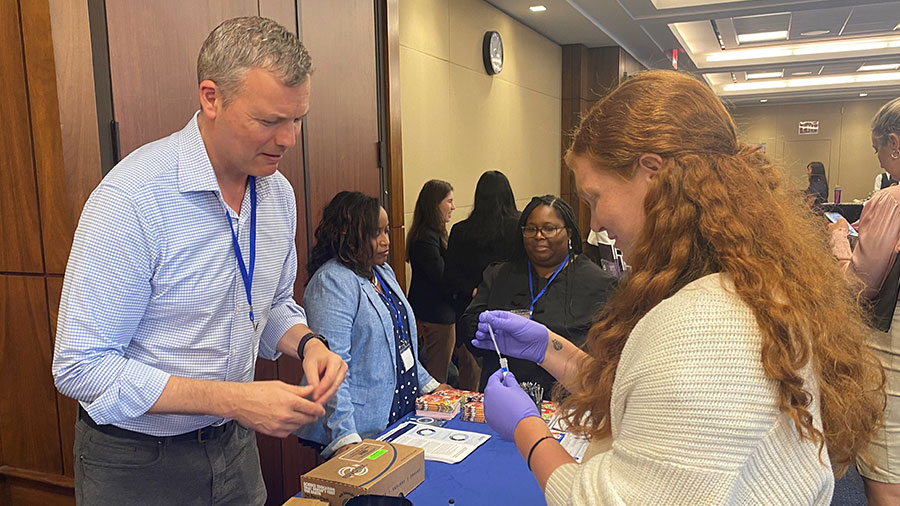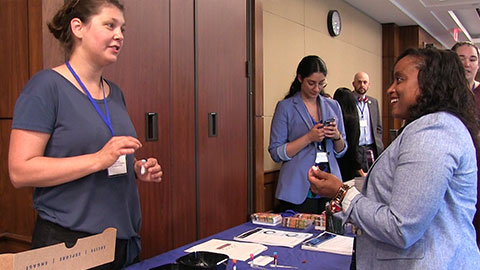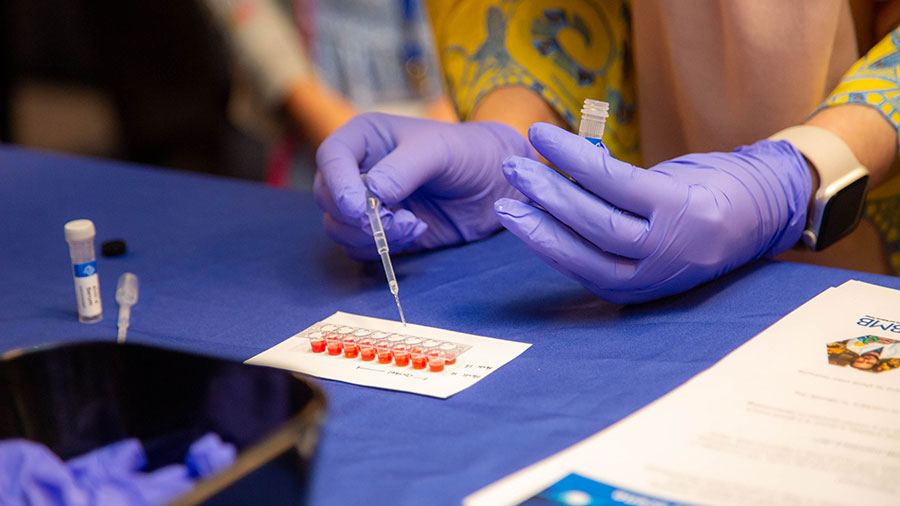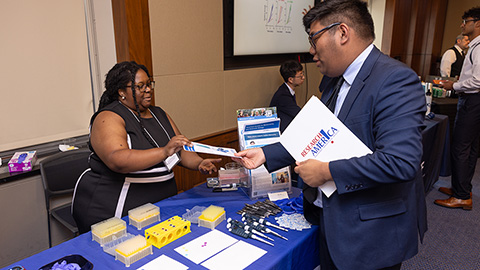Crime scene biochemistry at the Capitol
Last week, American Society for Biochemistry and Molecular Biology committee and staff members participated in the Congressional Life Sciences Fair hosted by the Coalition for Life Sciences and the Federation of American Societies for Experimental Biology on Capitol Hill. The purpose of the event was to give members of Congress and their staffers an opportunity to learn about science and scientific advocacy organizations in a hands-on way. The ASBMB was one of 15 invited organizations that participated in the event; others included the University of Chicago, the American Society of Plant Biologists, the Jackson Laboratory and more.

at the ASBMB booth July 19 at Capitol Hill.
“We wanted to participate in this event to get an audience with congressional staffers,” Sarina Neote, public affairs director of the ASBMB, said. “Their job is to make recommendations on budget increases on programs that need to be supported or programs that need to be cut. Our goal is to convey the importance of basic scientists and how Congress can support us. Then, we hope they inform their boss, whether that's a House rep or senator, what they've learned. Another benefit to making contact with the staffers is that we can establish ourselves as a resource, and a lot of staffers seek out advice from offices like ours on important issues.”


Greg Miller, an ASBMB Science Outreach and Communication Committee member and associate professor of biochemistry at the Catholic University of America, and Shantá D. Hinton, an ASBMB Public Affairs Advisory Committee member and a professor of biology at William & Mary, conducted a forensic science immunoassay demonstration.
“We wanted to show the types of experiments that our community members do but connect it to something that we think about in the real world,” Kirsten Block, director of education, professional development and outreach at the ASBMB, said. “We have all seen crime shows, so this demo is an easy way for people to put themselves in the shoes of a forensic scientist doing these experiments. We can use the activity as a talking point about the types of research that our members do and why it is important.”
The color-changing, texture-changing Edvotek activity simulates a crime scene investigation. Participants use pipettes and an immunoassay to type and identify “blood” samples.
“This event is great because it allows individuals to come in and actually perform an experiment with their own hands and ask questions,” Hinton said. “They can see how the experiment they are performing is used for education. It is a great example of how what scientists do ties into the community.”
The event also gave the ASBMB an opportunity to connect with other advocacy organizations, such as Research America, and undergraduates interested in science.
“It’s important to talk with government officials and staffers because we all have our own bubbles,” Miller said. “Just as my bubble is far away from politics, elected officials’ bubble is pretty far away from biochemistry. So, it's nice to have a space to talk about how our two bubbles actually do overlap.”
Enjoy reading ASBMB Today?
Become a member to receive the print edition four times a year and the digital edition monthly.
Learn moreGet the latest from ASBMB Today
Enter your email address, and we’ll send you a weekly email with recent articles, interviews and more.
Latest in Policy
Policy highlights or most popular articles

Embrace your neurodivergence and flourish in college
This guide offers practical advice on setting yourself up for success — learn how to leverage campus resources, work with professors and embrace your strengths.

ASBMB honors Lawrence Tabak with public service award
He will deliver prerecorded remarks at the 2025 ASBMB Annual Meeting in Chicago.

Summer internships in an unpredictable funding environment
With the National Institutes of Health and other institutions canceling summer programs, many students are left scrambling for alternatives. If your program has been canceled or delayed, consider applying for other opportunities or taking a course.

Black excellence in biotech: Shaping the future of an industry
This Black History Month, we highlight the impact of DEI initiatives, trailblazing scientists and industry leaders working to create a more inclusive and scientific community. Discover how you can be part of the movement.

ASBMB releases statement on sustaining U.S. scientific leadership
The society encourages the executive and legislative branches of the U.S. government to continue their support of the nation’s leadership in science.

ASBMB and advocacy: What we accomplished in 2024
PAAC members met with policymakers to advocate for basic scientific research, connected some fellow members with funding opportunities and trained others to advocate for science.

